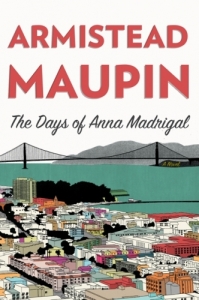In this ninth Tales of the City novel, The Days of Anna Madrigal, Armistead Maupin is content to show his characters being themselves. That’s no mean feat, for it requires creating characters who are both believable and interesting in themselves, and sustaining it over one or several books. Many authors do not appear to have the confidence to allow their characters to develop in a way that appears natural. I even thought that Maupin was one such author — in the middle books of the set, the characters‘ personal histories and interrelationships go from mildly Baroque to floridly rococo — but in the last two, he has simplified his sprawling cast (even as a new generation has come on stage), and concentrated on characters who are at the heart of the long work.
First was Mary Ann Singleton, the original Midwestern girl whose tales of moving to San Francisco started everything. Mary Ann in Autumn charted her return, many years later, following a career back on the East Coast and a divorce, as she fends off cancer and makes peace with people and places. Now Anna Madrigal, once the landlady and den mother to the novels’ cast of characters, has reached the advanced age of 92.
He settled in the other chair. “I talked to Anna last night. She sounded good.”
Shawna shrugged. “She’s okay.”
“What’s the matter?”
“She’s ninety-fucking-two, Dad.”
“She’s not sick, though?”
“No—just kinda … packing up.”
He took that in glumly, saying nothing.
She stroked the arm of the chair, comforting something inanimate in lieu of the more vulnerable human alternative. “We have to honor it, Dad. Anything else would just make her feel alone. We have to—”
She didn’t finish, so he did it for her. “‘Drive her to the station and wave good-bye.'” He was quoting Mrs. Madrigal herself. Their long-ago landlady had hit them with that sobering train metaphor a few years back. They were not to make a fuss, she had said then, but she wouldn’t mind having “family on the platform.”
While the end of Anna’s days permeates the book, it is anything but an elegy, and she is as cheerfully irreverent as she ever was. She’s also keen to wrap up a few pieces of unfinished business, and this, as much as anything, drives the story. It also enables Maupin to tell of some of Anna’s earliest days in flashbacks set in small-town Nevada when Anna was a Depression-era child. Nine books later, readers are still learning new things about Mrs. Madrigal.
The present-day story eventually takes most of the characters to Burning Man, an annually temporary colony of the Bay Area in the Nevada desert. For people who want to see them, there are implied contrasts between the community of fate when Anna was a teen and the intentional community created by and for Burning Man; there are also contrasts within the people participating in the Burning Man event, a way for Maupin to show the creativity of the event, as well as the foibles and absurdities that come along with it.
Mostly, however, the book offers a chance to spend more time with people that readers have known for 30 years or more, people who have now led full lives and are reflecting on them, even while setting forth new chapters.
Mary Ann had sent [Michael] on his way that night [in the 1970s]. Squeaky clean out of Cleveland, she had already begun to accept his brand-new randiness as if it were her own. “Go find a nice billy goat,” she had told him with a playful shove, and in some ways that was the version of her he still maintained, the smart girl creeping up on adventure with one eye covered, not the liberal rich lady from Woodside taking Zumba lessons at the Zen Center. He had come to like the later-day Mary Ann, but never with the intimacy of old. She probably felt the same about him—that stodgy old queen fussing in his garden, holed up with his younger husband in the Castro.

